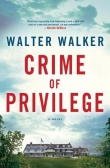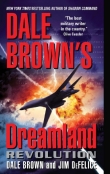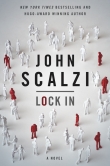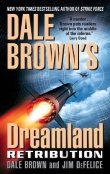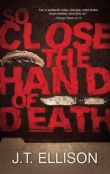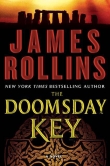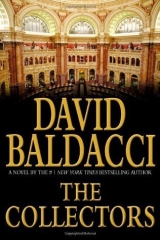
Текст книги "The Collectors"
Автор книги: David Baldacci
сообщить о нарушении
Текущая страница: 2 (всего у книги 27 страниц)
Chapter 3
Over dinner that night in L.A. Annabelle laid out parts of her plan to Leo, including the two players she was looking to bring on.
“Sounds good, but what about the long con? You haven’t told me about that.”
“One step at a time,” she answered, fingering a wineglass, her gaze wandering around the swanky dining room automatically searching for potential marks.
Take a breath, find a chump. She flicked her dyed–red hair out of her face and made momentary eye contact with a guy three tables down. This jerk had been ogling and overtly signaling Annabelle in her little black dress for the last hour while his humiliated date sat silently fuming. Now he slowly licked his lips and winked at her.
Uh–uh, slick, you couldn’t even come close to handling it.
Leo interrupted this thought. “Look, Annabelle, I’m not going to screw you. Hell, I came all this way.”
“Right, you came all this way on my dime.”
“We’re partners, you can tell me. It goes no further.”
Her gaze drifted over him as she finished her cabernet. “Leo, don’t bother. Even you’re not that good of a liar.”
A waiter came by and handed her a card. “From the gentleman over there,” he said, pointing to the man who’d been ogling her.
Annabelle took the card. It said that the man was a talent agent. He’d also helpfully written on the back of the card a specific sex act he’d like to perform on her.
Okay, Mr. Talent Agent. You asked for it.
On the way out she stopped at a table with five stout guys in pinstripe suits. She said something and they all laughed. She gave one of them a pat on the head and another, a man of about forty with gray temples and thick shoulders, a peck on the cheek. They all laughed at something else Annabelle said. Then she sat down and talked with them for a few minutes. Leo looked at her curiously as Annabelle left the table and walked past him toward the exit.
As she passed the talent agent’s table, he said, “Hey, baby, call me. I mean it. You are so hot, I’m on fire!”
Annabelle swiped a glass of water off the tray of a passing waiter and said, “Well, then let’s cool you off, stud.” She dumped the water in the guy’s lap. He jumped up.
“Damn it! You’re gonna pay for that, you crazy bitch.”
His date covered her mouth to hide her laughter.
Before the man could reach out to grab her, Annabelle shot out a hand and clutched his wrist. “You see those boys over there?” She nodded at the five suits that sat staring at the man hostilely. One of them cracked his knuckles. Another slid his hand inside his suit jacket and kept it there.
Annabelle said smoothly, “I’m sure you saw me talking to them, since you’ve been staring at me all night. They’re the Moscarelli family. And the one on the end there is my ex, Joey Junior. Now, even though I’m no longer technically in the family, you never really leave the Moscarelli clan.”
“Moscarelli?” the man said defiantly. “Who the hell are they?”
“They were the number three organized crime family in Vegas before the FBI ran them and everybody else out. Now they’ve gone back to doing what they do best: controlling the garbage unions in the Big Apple and Newark.” She squeezed his arm. “So if you have a problem with your wet pants, I’m sure Joey will take care of it.”
“You think I’m buying that crap?” the guy shot back.
“Well, if you don’t believe me, go over there and talk to him about it.”
The man looked over at the table again. Joey Junior was holding a steak knife in his beefy hand while one of the other men was attempting to keep him in his seat.
Annabelle gripped the man’s arm tighter. “Or do you want me to have Joey come over here with some of his friends? Don’t worry; he’s out on parole right now, so he can’t bust you up really bad without ticking off the feds.”
“No. No!” the alarmed man said as he tore his gaze from murderous Joey Junior and his steak knife. He added quietly, “I mean, it’s no big deal. Just a little water.” He sat back down and dabbed at his soaked crotch with a napkin.
Annabelle turned to his date. The woman was trying and failing to hold back her giggles. “You think it’s funny, sweetie?” Annabelle said. “This is a case of where we’re all laughing at you, not with you. So why don’t you try finding some self–respect, or little shits like him are the only slime you’ll be waking up next to until you’re so old nobody will give a crap anymore. Including you.”
The lady stopped laughing.
On the way out of the restaurant Leo said, “Wow, and here I was wasting my time reading Dale Carnegie when all I needed to do was hang around you.”
“Give it a rest, Leo.”
“Okay, okay, but the Moscarelli family? Come on. Who were they really?”
“Five accountants from Cincinnati probably looking to get laid tonight.”
“You’re lucky they seemed pretty tough.”
“It wasn’t luck. I said I was practicing a scene from a movie with a friend of mine in public. I told them it happens all the time in L.A. I asked them to help out, that they were to look like the mob; you know, to give us the right atmosphere to deliver our lines. I told them if they did well enough, they might even get a part in the film. It’s probably the most excitement they’ve ever had.”
“Yeah, but how’d you know that jerk would collar you on the way out?”
“Oh, I don’t know, Leo, maybe it was that tent pole in his pants. Or did you think I just threw the water in his crotch for the hell of it?”
• • •
The next day Annabelle and Leo cruised down Wilshire Boulevard in Beverly Hills in a rented dark blue Lincoln. Leo intently eyed the shops they were passing. “How’d you get a lead on him?”
“Usual sources. He’s young and doesn’t have much street experience, but his specialty is why I’m here.”
Annabelle pulled into a parking place and pointed to a storefront up ahead. “Okay, that’s where gadget boy screws the retail consumer.”
“What’s he like?”
“Very metrosexual.”
Leo looked at her quizzically. “Metrosexual? What the hell’s that? New kind of gay freak?”
“You really need to get out more, Leo, and work on your PC skills.”
A minute later Annabelle led Leo into a high–end clothing boutique. Inside the store, they were greeted by a lean, good–looking young man dressed all in chic black with slicked–back blond hair and a day’s worth of fashionable stubble on his face.
“You here all by yourself today?” she asked him, looking around at the other well–heeled customers in the store. They’d have to be wealthy, she knew, since the shoes here started at a thousand bucks a pair, entitling the lucky owner to stumble around on four–inch golf tees until her Achilles snapped.
He nodded. “But I enjoy working the store. I’m very service–oriented.”
“I’m sure you are,” Annabelle said under her breath.
After waiting until the other customers had left the shop, Annabelle put the Closed sign on the front door. Leo brought a woman’s blouse to the cash register while Annabelle wandered around behind the checkout area. Leo handed over his credit card, but it slipped out of the clerk’s hand and the man bent down to retrieve it. When he straightened up, he found Annabelle standing right behind him.
“That’s a really neat toy you have there,” she said, eyeing the tiny machine the clerk had just swiped Leo’s card through.
“Ma’am, you’re not allowed behind the counter,” he said, frowning.
Annabelle ignored this comment. “Did you build it yourself?”
The clerk said firmly, “It’s an antifraud machine. It confirms that the card is valid. It checks encryption codes embedded in the plastic. We’ve had a lot of stolen credit cards come in here, so the owner instructed us to start using it. I try to do it as unobtrusively as possible so no one gets embarrassed. I’m sure you can understand.”
“Oh, I completely understand.” Annabelle reached by the clerk and slid out the device. “What this does, Tony, is read the name and account number, and the embedded verification code on the magnetic stripe so you can forge the card.”
“Or more likely sell the numbers to a card ring that’ll do it,” Leo added. “That way you don’t have to get your metrosexual hands really dirty.”
Tony looked at both of them. “How do you know my name? You cops?”
“Oh, much better than that,” Annabelle said, putting her arm around his slender shoulders. “We’re people just like you.”
• • •
Two hours later Annabelle and Leo were walking down the pier in Santa Monica. It was a bright cloudless day, and the ocean breeze delivered waves of deliciously warm air. Leo wiped his forehead with a handkerchief, took off his jacket and carried it over his arm.
“Damn, I’d forgotten how nice it was out here.”
“Beautiful weather and the best marks in the world,” Annabelle said. “That’s why we’re here. Because where the best marks are …”
“Are where the best cons are,” Leo finished for her.
She nodded. “Okay, that’s him, Freddy Driscoll, crown prince of bad paper.”
Leo stared ahead, squinting against the sun, and read the small sign over the outdoor kiosk. “Designer Heaven?”
“That’s right. Do it like I said.”
“What other way is there to do it but like you said?” Leo grumbled.
They reached the merchandise display where jeans, designer bags, watches and other accessories were neatly arranged. The older man next to the kiosk greeted them politely. He was small and plump with a pleasant face; tufts of white hair stuck out from underneath the straw hat he wore.
“Wow, these are great prices,” Leo commented as he looked over the items.
The man beamed proudly. “I don’t have the overhead of the fancy stores, just the sun, sand and ocean.”
They looked through the merchandise, selected a few items, and Annabelle handed the man a hundred–dollar bill in payment.
He took it from her, put on a pair of thick glasses, held the bill up at a certain angle and then quickly handed it back. “Sorry, ma’am, I’m afraid that’s a forgery.”
“You’re right, it is,” she said casually. “But I thought it was fair to pay for fake goods with fake money.”
The man didn’t even blink; he just smiled at her benignly.
Annabelle examined the bill in the same way the man had. “The problem is that not even the best forger can really duplicate Franklin’s hologram when you hold the bill at this angle, because you’d need a two–hundred–million–dollar printing mill to get it right. There’s only one of them in the States, and no forger has access to it.”
Leo piped in, “So you take a grease pen and do a nifty sketch of old Benny. That gives anyone smart enough to check the paper a little flash and the illusion that he saw the h–gram when he really didn’t.”
“But you knew the difference,” Annabelle pointed out. “Because you used to make this paper about as well as anyone.” She held up a pair of jeans. “But from now on, I’d tell your supplier to take the time to stamp the brand name on the zipper like the real manufacturers do.” She put the jeans down and picked up a handbag. “And double–stitch the strap. That’s a dead giveaway too.”
Leo held up a watch that was for sale. “And real Rolexes sweep smoothly, they don’t tick.”
The man said, “I’m really shocked that I’ve been the victim of counterfeit merchandise. I saw a police officer just a few minutes ago farther down on the pier. I’ll go and get him. Please don’t leave; he’ll want your full statements.”
Annabelle gripped his arm with her long, supple fingers. “Don’t waste your cover story on us,” she said. “Let’s talk.”
“What about?” he asked warily.
“Two shorts and then a long,” Leo answered, making the old man’s eyes light up.
Chapter 4
Roger Seagraves looked across the conference table at the mouse of a man and his pitiful comb–over consisting of a dozen strands of greasy black hair that vainly attempted to cover a wide, flaky scalp. The man was skinny in the shoulders and legs and fat in the belly and butt. Though still in his forties, he probably would’ve been hard–pressed to jog more than twenty yards without collapsing. Lifting a grocery bag would no doubt have taxed the limits of his upper body strength. He could be a poster boy for the physical degradation of the entire male race in the twenty–first century, Seagraves thought. It irked him because physical fitness had always played paramount importance in his life.
He ran five miles every day, finishing before the sun was fully up. He could still do one–handed push–ups and bench–press twice his own weight. He could hold his breath underwater for four minutes and sometimes worked out with the high school football team near his home in western Fairfax County. No man in his forties could keep up with seventeen–year–old boys, but he was never that far behind them either. In his previous career these skills had all served one purpose: keeping him alive.
His attention turned back to the man across the table from him. Every time he saw the creature a part of him wanted to place a round in the man’s forehead and put him out of his lethargic misery. But no sane person killed his golden goose or, in this case, golden mouse. Seagraves may have found his partner physically lacking, but he needed the man nonetheless.
The creature’s name was Albert Trent. The man had a brain under the wretched body, Seagraves had to give him that. An important element of their plan, perhaps the most important detail, had, in fact, been Trent’s idea. It was for this reason more than any other that Seagraves had agreed to partner with him.
The two men spoke for some time about the upcoming testimony of CIA representatives to the House Permanent Select Committee on Intelligence, of which Albert Trent was a prominent staff member. Next they covered key bits of intelligence gathering undertaken by the folks at Langley and other agencies in the U.S. government’s vast arsenal of spooks. These folks spied on you from outer space, through your phone, fax, e–mail and sometimes right over your shoulder.
Finished, the two men sat back and drank down their lukewarm coffee. Seagraves had yet to find a bureaucrat who could make a decent cup of coffee. Maybe it was the water they had up here.
“The wind’s really picking up outside,” Trent said, his eyes on the briefing book in front of him. He smoothed his red tie over his flab and rubbed his nose.
Seagraves glanced out the window. Okay, now it was code time, just in case someone was listening in. These days nowhere was safe from prying ears, least of all Capitol Hill. “Front’s coming in, I saw on the news. Might get some rain later, but then again, maybe not.”
“I heard a thunderstorm was possible.”
Seagraves perked up at this. A thunderstorm reference always got his attention. Speaker of the House Bob Bradley had been such a thunderstorm. He was now lying in a plot of dirt back in his native Kansas with a bunch of wilted flowers on top of him.
Seagraves chuckled. “You know what they say about the weather: Everyone talks about it, but no one does a damn thing about it.”
Trent laughed too. “Everything looks good here. We appreciate Central Intelligence’s cooperation as always.”
“Didn’t you know? The ‘C’ stands for cooperation.”
“We still set for the DDO’s testimony on Friday?” he asked, referring to the CIA’s deputy director of operations.
“Yep. And behind closed doors we can be very candid.”
Trent nodded. “The new committee chairman knows how to play by the rules. They already took a roll call vote to close the hearing.”
“We’re at war with terrorists, so it’s a whole new ball game. Enemies of this country are everywhere. We have to act accordingly. Kill them before they get us.”
“Absolutely,” Trent agreed. “It’s a new age, a new kind of fight. And perfectly legal.”
“Goes without saying.” Seagraves stifled a yawn. If anyone was listening, he hoped they’d enjoyed the patriotic crap. He’d long since stopped caring about his country – or any other country, for that matter. He was now solely into caring about himself: the Independent State of Roger Seagraves. And he had the skills, nerve and access to things of enormous value to do something about it. “Okay, unless there’s anything else, I’ll be hitting the road. Traffic will be a bitch this time of day.”
“When isn’t it?” Trent tapped the briefing book as he said this.
Seagraves glanced at the book he’d given the other man even as he picked up a file Trent had pushed across to him. The file contained some detailed requests for information and clarification regarding certain surveillance practices of the intelligence agency. The massive briefing book he’d left for Trent held nothing more exciting than the usual dull–as–dirt overly complicated analysis his agency routinely fed the oversight committee. It was a masterpiece of how to say absolutely nothing in the most confusing way possible in a million words or more.
However, if one read between the proverbial lines, as Seagraves knew that Trent would do that very evening, the briefing book’s pages also revealed something else: the names of four very active American undercover agents and their current locations overseas, all in coded form. The right to the delivery of these names and addresses had already been sold to a well–financed terrorist organization that would knock on these people’s doors in three countries in the Middle East and blow their heads off. Two million dollars a name in U.S. dollars had already been wired to an account that no American bank regulator would ever audit. Now it was Trent’s job to move the stolen names on down the food chain.
Business was booming for Seagraves. As the number of America’s global enemies continued to pile up, he was selling secrets to Muslim terrorists, communists in South America, dictators in Asia and even members of the European Union.
“Happy reading,” Trent said, referring to the file he’d just given him. It was here that the encrypted identity of the “thunderstorm” would be revealed to Seagraves along with all the whys and wherefores.
At his home later that night Seagraves stared at the name and began plotting the mission in his usual methodical way. Only this time it would take something far more subtle than a rifle and scope. Here Trent came through like a gem with a piece of intelligence on the target that simplified things greatly. Seagraves knew just whom to call.
Chapter 5
Punctually at six–thirty on a clear, cool morning in Washington, D.C., the front door of Jonathan DeHaven’s three–story home opened, and out he stepped dressed in a gray tweed jacket, pale blue tie and black slacks. A tall, spare man in his mid–fifties with a carefully combed head of silver hair, DeHaven inhaled the refreshing air and spent a few moments gazing at the row of magnificent old mansions that lined his street.
DeHaven was far from the wealthiest person in his neighborhood, where the average price of a towering brick structure would set the purchaser back several million dollars. Luckily, he’d inherited his place from parents savvy enough to be early investors in the choicest D.C. real estate. Although much of their estate had gone to charity, the DeHavens’ only child had also been left a sizable amount to supplement his government salary and indulge certain whims.
Even though this windfall had allowed DeHaven to pursue his life without worrying about earning money by any means possible, this was not true of other dwellers on Good Fellow Street. In fact, one of his neighbors was a merchant of death – though DeHaven supposed the politically correct term was “defense contractor.”
The man, Cornelius Behan – he liked to be called CB – lived in a palatial space that cobbled two original dwellings into a fifteen–thousand–square–foot behemoth. DeHaven had heard rumors that this had been accomplished in the strictly controlled historical area by well–timed bribes. This conglomerate not only boasted a four–person elevator but also had separate servant’s quarters with actual servants living in them.
Behan also brought an assortment of ridiculously beautiful women to his manse at odd hours, though he did have the decency to wait until his wife was out of town, often on one of her shopping sprees in Europe. DeHaven trusted that the wronged woman enjoyed her own dalliances while across the Atlantic. This summoned up an image of the elegantly attractive lady being mounted by a young French lover while perched nude on an enormous Louis XVI dining table with “Bolero” playing in the background. And bravo for you, DeHaven thought.
He cast aside thoughts of his neighbors’ peccadilloes and set off to work with a lively bounce in his step. Jonathan DeHaven was the immensely proud director of the Rare Books and Special Collections Division at the Library of Congress, arguably the finest rare books collection in the world. Well, the French, Italians and Brits might debate the point, but the obviously biased DeHaven knew that the American version was the best.
He walked about a quarter mile along a series of rumpled brick sidewalks, with a precise tread learned from his mother, who’d meticulously marched every step of her long life. On the day before she died DeHaven was not completely sure his famously imperious mother wouldn’t simply skip the funeral and stalk right up to heaven demanding to be let in so she could commence running things. At one corner he boarded a crowded Metro bus, where he shared a seat with a young man covered in drywall dust, a battered ice cooler wedged between his feet. Twenty–five minutes later the bus dropped DeHaven off at a busy intersection.
He crossed the street to a small café, where he had his morning cup of tea and a croissant and read the New York Times. The headlines, as usual, were very depressing. Wars, hurricanes, a possible flu pandemic, terrorism, it was enough to make you crawl in your house and nail the doors shut. One story dealt with a probe into irregularities in the defense–contracting arena. There were allegations of bribery and corruption between politicians and weapons manufacturers. What a shock! A dollars–for–influence scandal had already brought down the former Speaker of the House. And then his successor, Robert Bradley, had been brutally murdered at the Federalist Club. The crime was still unsolved, although a domestic terrorist group, heretofore unknown, calling itself Americans Against 1984 – a reference to Orwell’s masterpiece of fascism – had claimed responsibility for the crime. The police investigation was not going well, at least according to the media.
DeHaven occasionally glanced out the café window at government workers striding with great purpose down the street ready to take on the world, or at least a nebbish senator or two. It really was the most unusual place, he thought. Here you had epic crusaders dancing alongside sleazy profiteers coupled with more than a fair sampling of idiots and intellectuals, with the former, unfortunately, usually holding higher positions of power. It was the only city in the United States that could declare war, raise your federal income tax or reduce your Social Security benefits. The decisions reached in these few square miles of monuments and mockeries made legions of people either furious or euphoric, and those sides kept switching depending on who was in control of the government at any given time. And the fights, spins and conspiracies concocted and then carried out to hold or regain power consumed every ounce of energy that enormously bright and talented people could give it. The swirling, ever–changing mosaic had too many frenetically moving parts for any outsider to even come close to comprehending what was really going on. It was like a lethal kindergarten that never ended.
A few minutes later DeHaven trotted up the broad steps of the massively domed Library of Congress’ Jefferson Building. He signed for the alarmed door keys from the library police and headed up to the second floor, quickly making his way to room LJ239. Located here were the Rare Books reading room and the honeycombed series of vaults that kept secure many of the nation’s paper treasures. These bibliophilic riches included an original printed copy of the Declaration of Independence that the Founding Fathers had labored over in Philadelphia on the march to freedom from England. What would they think of the place now?
He unlocked the massive outer doors of the reading room and swung them back against the inside walls. Then he performed the complicated keypad procedure allowing him to enter the room. DeHaven was always the first person to arrive here each day. While his typical duties kept him away from the reading room, DeHaven had a symbiotic relationship with old books that would be inexplicable to a layperson and yet a bond immediately understandable to a bibliophile of even modest addiction.
The reading room was not open on the weekends, which allowed DeHaven to ride his bike, collect rare books for his personal collection and play the piano. It was a skill he’d learned under the rigorous tutelage of his father, whose ambition to be a concert pianist had been rudely crushed by the reality that he wasn’t quite good enough. Unfortunately, neither was his son. And yet ever since his father’s death, DeHaven had actually enjoyed playing. Despite sometimes bristling under their strict code of conduct, he had almost always obeyed his parents.
In fact, he had really only performed one act that had gone against their wishes, yet it was quite a large transgression. He’d married a woman nearly twenty years younger than him, a lady quite apart from his station in life, or so his mother had informed him over and over until she’d badgered him into having the marriage annulled a year later. However, no mother should be able to force her son to leave the woman he loved, even with the threat of cutting him off financially. His mother had stooped as low as telling him she would also sell all of her rare books, which she had promised to leave to him. Yet he should have been able to stand up to her, tell her to back the hell off. He thought this now, of course, far too late. If only he had possessed a backbone years ago.
DeHaven sighed wistfully as he unbuttoned the front of his jacket and smoothed down his tie. It had quite possibly been the happiest twelve months of his life. He had never met a person like her before, and he was certain he wouldn’t again. Yet I just let her go because my mother bullied me into it. He’d written the woman for years afterward, apologizing any way he could. He sent her money, jewelry and exotic items from his trips around the world, but he never asked her to come back. No, he’d never done that, had he? She wrote him back a few times, but then his packages and letters started being returned unopened. After his mother died, he considered trying to find her, but finally decided it was too late. In truth, he didn’t deserve her anymore.
He took a deep breath, put the door keys in his pocket and gazed around the reading room. Patterned after the Georgian splendor of Independence Hall, the space had an immediate calming effect. DeHaven particularly loved the copper domed lamps that sat on all the tables. He ran his hand over one lovingly, and the sense of failure in losing the only woman who’d ever given him complete happiness began to fade.
DeHaven walked across the room and pulled out his security card. He waved it in front of the computer access pad, nodded to the surveillance camera bolted into the wall above the door and walked into the vault. Coming here each morning was a daily ritual; it helped to recharge his batteries, reinforce the notion that it really was all about the books.
He spent some time in the hallowed grounds of the Jefferson Room leafing through a copy of the work of Tacitus, a Roman that the third U.S. president much admired. Next he used his keys to enter the Lessing J. Rosenwald Vault, where incunabula and codex donated by Rosenwald, the former head of Sears, Roebuck, sat next to each other on metal shelves in a room that, at great cost, was climate–controlled 24/7. Though the library operated on a very tight budget, a constant temperature of sixty degrees with a relative humidity of 68 percent could allow a rare book to survive for at least several more centuries.
For DeHaven it was well worth the extra money to a federal budget that had always allocated more to war than it ever did to peaceful purposes. For a fraction of the cost of one missile he could purchase on the open market every work the library needed to round out its rare books collection. Yet politicians believed that missiles kept you safe, whereas actually books did, and for a simple reason. Ignorance caused wars, and people who read widely were seldom ignorant. Perhaps it was an overly simplistic philosophy, but DeHaven was sticking to it.
As he looked over the books on the shelves DeHaven reflected on his own book collection housed in a special vault in the basement of his home. It wasn’t a great collection but a very satisfactory one. Everyone should collect something, DeHaven felt; it just made you feel more alive and connected to the world.
After checking on a couple books that had just come back from the conservation department, he headed up the stairs to the vaults that stretched over the reading room. It was here that an early collection of American medical books was kept. And on the mezzanine level just above, a large array of children’s books were housed. He stopped to affectionately pat the head of a small bust of a man that had sat on a small table in a corner for as long as anyone could remember.
A moment later Jonathan DeHaven collapsed into a chair and commenced dying. It was not a pleasant or painless death, as evidenced by the convulsions and silent screams as life was squeezed from his body. By the time it was over a mere thirty seconds later he was stretched out on the floor a full twenty feet from where he’d started. He seemed to stare at a collection of stories that had girls in tea dresses and sun hats on the covers.
He died without knowing what had killed him. His body had not betrayed him; he was in perfect health. No one had done him blunt injury, and no poison had touched his lips; he was, in fact, completely alone.
